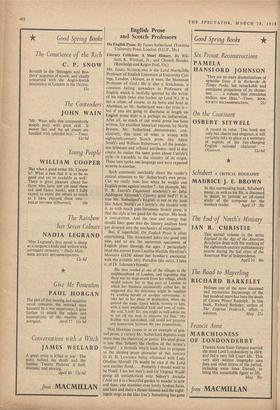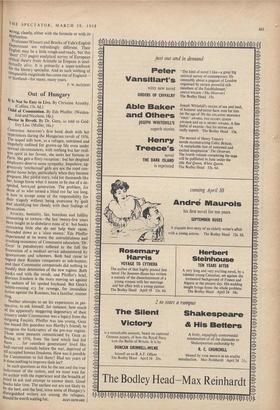English Prose and Scotch Professors
MR. JAMES SUTHERLAND ig the Lord Northcliffe' Professor of English Literathre at University Col- lege, London. (Almost, as it were, the Mammon Professor of God.) He is also a Scotchman, a common failing nowadays in Professors of English which is tactfully ignored by the writer of his blurb (who also hushes up Lord N.). It is not a crime, of course, to be born and bred in Aberdeen, as Mr. Sutherland was—far from it— but if you are going to discourse at length on English prose style it is perhaps an indiscretion. After all, so much of our worst prose has been written, for excellent historical reasons, by North Britons. Mr. Sutherland demonstrates, con- clusively., that most of what is wrong with eighteenth-century Scotch prose, like Adam Smith's and William Robertson's, all the ponder- ous latinisms and inflated antitheses—and in due course he makes the same point about Carlyle's style—is traceable to the country of its origin. These men spoke one language and were expected to write in another.
Such comments inevitably direct the• reader's critical attention to Mr. Sutherland's own prose. Can we really trust him when he weighs one English prose against another?—for example, Mr. F. R. Leavis's (agonized academic') or John Addington Symonds's ('poetry gone bad')? It is true Mr. Sutherland's English is not in the )east like Adam Smith's or Carlyle's; the trouble with it, as with much post-Stevenson Scotch prose, is that the style is too good for the matter. His book is over-written. And the time and energy that should have gone into the literary analysis have got diverted into the mechanics of expression.
But, if superficial, On English Prose is often entertaining. The occasional jokes are good and new, and so are the numerous specimens of English prose through the ages. I particularly liked the extract from Laetitia-Matilda Hawkins's Memoirs (1824) about her brother's encounter with the irritable Mrs. Paradise (the relict, I take it, of Dr. Johnson's friend): She then resided at one of the villages in the neighbourhood of London, and regretting that there was no stage-coach from her village, which would convey her to that part of London to which her business occasionally called her, he suggested that the deficiency might be supplied by availing herself of another conveyance, to take her to her place of destination, when she quitted the stage. Upon which, turning to him, with a most emphatical look and tone of voice, she said, 'Lord! Sir, you might as well advise me to cut oft. my nose to improve my face.' My brother was astonished, and could not perceive any connection between the two propositions.
Miss Hawkins comes in as an example of gen- teel-prose, a variety Mr. Sutherland deplores even more than the rhetorical or poetic. His ideal prose is one that 'follows the rhythm of the writer's thought' : a formula which leads him to propose as the shining prose pinnacles of this century (i) D. H. Lawrence being whimsical with Lady Ottoline Morrell ('It would be nice if the Lord sent another flood.. .. Probably I should want to be Noah. I am not sure'), and (ii) Virginia Woolf going all metaphorical over Sidney's Arcadia (And yet it is a beautiful garden to wander in now and then; one stumbles over lovely broken faces, and here and there a flower blooms and the night- ingale sings in the lilac tree'). Something has gone
Wrong, clearly, either with the formula or with its application.
Professors Wimsatt and Brooks of Yale's English Department are refreshingly different. Their English may be a little rough-and-ready, but this short' (755 pages) analytical survey of European critical theory from Aristotle to Empson is intel- lectually alive. It is primarily a super-textbook for the literary specialist. And as such nothing of comparable magnitude has come out of England— or Scotland—for many, many years.
F. W. BATESON











































 Previous page
Previous page